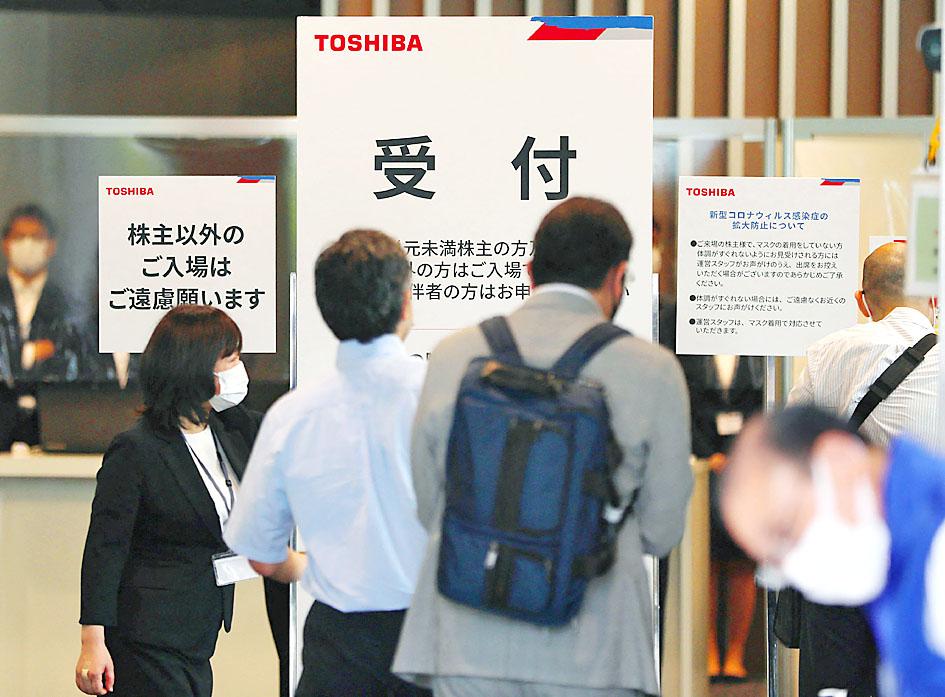Toshiba Corp shareholders voted to oust Osamu Nagayama as board chairman in a rare triumph for activist investors seeking fundamental reform after years of scandal and allegations of mismanagement.
The surprise decision on Nagayama, the 74-year-old outside director some investors opposed publicly, came after a contentious meeting with shareholders that extended for nearly three hours.
His departure marks a high point in the months-long campaign by largest shareholder, Effissimo Capital Management Pte, to probe the company’s governance.

Photo: AFP
An investigation prompted by its efforts uncovered alleged collusion with top government officials to influence last year’s board selection.
Toshiba’s shares closed 0.62 percent lower in Tokyo after initially surging following the vote.
Nagayama’s ouster is highly unusual for Japan’s typically staid and conservative corporate culture. For decades, corporations like Toshiba have been run with what critics say is little regard for the interests of private shareholders.
However, activist investors have gone from largely impotent onlookers to influential voices in the space of just a few years, and the company’s annual general meeting (AGM) was a new milestone.
They have increasingly been flexing their muscle, as corporate governance reforms promoting shareholder value have meant management can no longer so easily dismiss external pressure.
“We hope that today’s AGM marks the beginning of a new era at Toshiba — one that will be marked by a focus on value creation, transparency to all stakeholders and a renewed commitment to building trust with shareholders,” 3D Investment Partners Pte, one of the biggest holders of Toshiba stock, said in a statement.
3D welcomed the changes to the board and indicated its optimism about the firm’s future potential.
The report looking into Toshiba’s governance also marked a rare public account of Japan’s bureaucrats allegedly coordinating with a private company to exert control over foreign shareholders. The 139-page document by three independent investigators outlined how Toshiba management allegedly worked hand in hand with public officials in an attempt to sway the outcome of last year’s AGM. Among the officials named was Japanese Prime Minister Yoshihide Suga.
Ahead of yesterday’s vote, Toshiba CEO Satoshi Tsunakawa — who stepped into the post recently after the departure of under-pressure former leader Nobuaki Kurumatani — endorsed Nagayama’s handling of the current crisis and reiterated his faith in the board chair.
Investors were not convinced that enough was being done to address the serious allegations levied against the company and several of them voiced passionate critiques during the meeting.
“Given Toshiba’s stature as a blue-chip company and the seniority of the government officials and management involved, the vote is a message from domestic investors that malfeasance and shareholder oppression is a matter of the past and will no longer be tolerated,” said Justin Tang (鄧文雄), head of Asia research at United First Partners in Singapore. “This result is a sign of a paradigm shift in Japan and will only embolden activist investors whether foreign or domestic.”

South Korea’s equity benchmark yesterday crossed a new milestone just a month after surpassing the once-unthinkable 5,000 mark as surging global memory demand powers the country’s biggest chipmakers. The KOSPI advanced as much as 2.6 percent to a record 6,123, with Samsung Electronics Co and SK Hynix Inc each gaining more than 2 percent. With the benchmark now up 45 percent this year, South Korea’s stock market capitalization has also moved past France’s, following last month’s overtaking of Germany’s. Long overlooked by foreign funds, despite being undervalued, South Korean stocks have now emerged as clear winners in the global market. The so-called “artificial intelligence

‘SEISMIC SHIFT’: The researcher forecast there would be about 1.1 billion mobile shipments this year, down from 1.26 billion the prior year and erasing years of gains The global smartphone market is expected to contract 12.9 percent this year due to the unprecedented memorychip shortage, marking “a crisis like no other,” researcher International Data Corp (IDC) said. The new forecast, a dramatic revision down from earlier estimates, gives the latest accounting of the ongoing memory crunch that is affecting every corner of the electronics industry. The demand for advanced memory to power artificial intelligence (AI) tasks has drained global supply until well into next year and jeopardizes the business model of many smartphone makers. IDC forecast about 1.1 billion mobile shipments this year, down from 1.26 billion the prior

People stand in a Pokemon store in Tokyo on Thursday. One of the world highest-grossing franchises is celebrated its 30th anniversary yesterday.

NEW IDENTITY: Known for its software, India has expanded into hardware, with its semiconductor industry growing from US$38bn in 2023 to US$45bn to US$50bn India on Saturday inaugurated its first semiconductor assembly and test facility, a milestone in the government’s push to reduce dependence on foreign chipmakers and stake a claim in a sector dominated by China. Indian Prime Minister Narendra Modi opened US firm Micron Technology Inc’s semiconductor assembly, test and packaging unit in his home state of Gujarat, hailing the “dawn of a new era” for India’s technology ambitions. “When young Indians look back in the future, they will see this decade as the turning point in our tech future,” Modi told the event, which was broadcast on his YouTube channel. The plant would convert